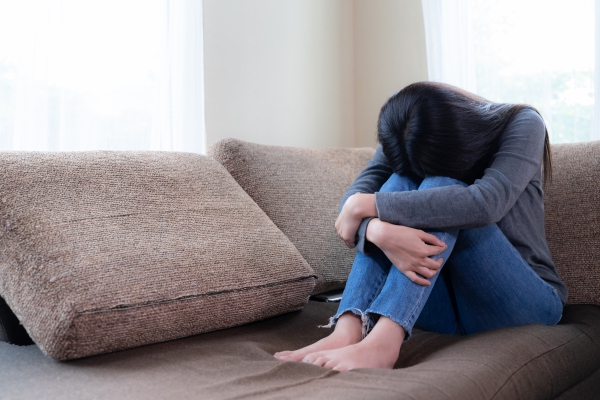What is postpartum depression?
Postpartum depression is a common psychological condition that affects women who recently gave birth to a baby. The baby’s birth can trigger a range of emotions in the mother ranging from intense joy and excitement to fear and feeling anxious. When this results in depression, this is known as postpartum depression.
Shortly after giving birth (postpartum period), 85% of women have some degree of mood disturbance. The American Academy of Paediatrics estimates that more than 400,000 infants are born to depressive mothers per year. However, most mothers get better quickly as the mood disturbances are transient and mild (postpartum blues or baby blues). 10-15% of women, on the other hand have more disabling and persistent symptoms of depression. In some cases (0.1-0.2%), some women may also have psychosis (hallucinations and delusions)
If postpartum depression is left untreated, it can put both the mother and the baby at risk of having significant long-term effects on the child’s development and behaviour.
What are the causes and risk factors for postpartum depression?
The exact cause of postpartum depression is unknown. However, there are several factors that can contribute to the development of the condition. These factors include:
- Physical changes: Once the baby is born, there are various changes that occur in a woman’s body. These include drop in hormones such as estrogen and progesterone. Childbirth also causes changes in thyroid hormones (hormones produced by the thyroid gland in the neck). These hormonal changes can cause tiredness, sluggishness and depression.
- Emotional changes: The arrival of a baby in the family is associated with sleep deprivation and an overwhelming sensation. This may cause changes in your capacity to deal with minor problems or issues that may arise. You may also at times feel like you are not being able to take care of your child and that you are failing as a mother. You may also feel unattractive and lost. All these feelings can contribute to the development of postpartum depression.

Besides, there are some factors that can increase your risk of having postpartum depression. These include:
- Not having people around you to support you
- Having relationship problems and discord with your spouse
- Having financial difficulties
- Loss of employment
- Partner violence
- Having a past history of depression
- Having close family members with depression or a mood disorder
- Having a baby with special needs or other health problems
- Having multiple births (twins, triplets, etc.)
- Having issues with breastfeeding
- The pregnancy was unwanted or unplanned
What are the signs and symptoms of postpartum depression?
Before knowing the symptoms of postpartum depression, it is important to make the difference between the different mood disorders that can arise after the birth of a baby.
About 85% of women have some degree of mood disturbances following childbirth. When the symptoms are present transiently and are mild, this is known as postpartum blues or baby blues. The symptoms present in postpartum blues include:

- Rapidly changing mood
- Tearfulness
- Irritability
- Anxiety
The symptoms of postpartum blues usually peak on the 4th or 5th day after delivery of the baby and most commonly resolve within the first 2 weeks after childbirth. The symptoms do not impair a mother’s ability to function and take care of her child. Resolution occurs without any specific treatment, other than support and reassurance.
Postpartum depression is when the symptoms are more severe and persistent compared to postpartum blues, and very often interferes with the mother’s ability to take care of her child and of herself. This occurs in around 10-15% of women. It arises during the first 4 months following delivery of the baby but can still occur up to the first year. The symptoms associated with postpartum depression include:
- Depressed mood
- Tearfulness
- Loss of interest in activities that you once enjoyed
- Insomnia
- Fatigue
- Change in appetite
- Having suicidal thoughts
- Having recurrent thoughts of death
- Intense sadness
- Anxiety
- Feeling desperate
- Thoughts about harming your baby
- Intense worries or obsessions about the baby’s health and wellbeing
Postpartum psychosis is the most severe form of psychiatric illness that can arise following childbirth. It is a rare condition that affects 1-2 per 1000 women. The symptoms present in postpartum psychosis include:

- Restlessness
- Insomnia
- Irritability
- Rapidly fluctuating mood
- Disorganized behaviour
- Delusional beliefs about the baby (for e.g. The baby is defective or the baby is a devil)
- Hallucinations (mainly auditory) that tells the mother to harm herself or the baby
- Suicidal thoughts or attempts

How is the diagnosis of postpartum depression made?
To make the diagnosis of postpartum depression, your doctor will start by asking you a series of questions to know more about your symptoms. He/she will focus on how you are feeling and what are your thoughts. He/she may also do a depression screening through the use of a questionnaire. Your doctor will also proceed with a physical examination to look for signs of postpartum depression and self-harm. There are no laboratory or imaging test to make the diagnosis of postpartum depression. However, in some cases, thyroid function tests may be ordered to see whether changes in thyroid hormones level may be the cause of the depression.
How is postpartum depression managed?
Postpartum blues, which is a less severe form of postpartum depression, does not require any treatment, apart from support and reassurance as it is a self-limited condition.

Postpartum depression and postpartum psychosis on the other hand require treatment to prevent possible complications for the mother and the child. The treatment choice will depend on your specific case and your doctor knows best which treatment will suit you best. Treatment options include:
- Psychotherapy: Psychotherapy, also known as talk therapy, can be done individually or as a group. This helps you to voice out your concerns to a medical health professional and help you find better ways to cope with your feelings and problems. You will also learn how to respond to situations and thoughts in a more positive way. Psychotherapy is particularly useful in women who are breastfeeding and who wish to avoid taking medications.
- Medications: These are usually initiated in women who do not respond to psychotherapy alone. In some cases, psychotherapy should be used in conjunction with medications for better results and response. Antidepressants are usually the first medications to be prescribed. Some examples include fluoxetine, sertraline and venlafaxine. Anxiolytics are also helpful in women with anxiety and sleep disturbances. In women with psychosis (hallucinations and delusions), antipsychotics and mood stabilizers are often prescribed.
- Electroconvulsive therapy (ECT): In this procedure, small electrical currents are transmitted through your brain using special devices in order to trigger a brief seizure. This is usually done in women with severe postpartum depression and those not responding to other treatments modes.
The earlier you seek help and get treated, the better the outcome.

What are the complications of postpartum depression?
Postpartum depression can negatively impact both the child and the mother. It brings about a change in the behaviour of the mother towards the child which impacts the mother-infant bonding. This bonding is crucial for the infant’s well-being and development. Postpartum depression also makes it more difficult for the mother to engage with the child. Mothers with this condition are also more likely to stop breastfeeding earlier. It has also been observed that children born to depressed mothers are more likely to have behavioural problems such as sleep or eating difficulties, throwing tantrums and hyperactivity.
What is the prognosis for postpartum depression?
With early intervention and treatment, the course of the condition is favourable. Postpartum blues usually resolve on its own. It is important to recognize the red flags quickly and seek medical help as soon as possible. It is also essential for the family members and spouse to support the mother as this can be a difficult phase to go through.

Source:
Peindl KS, Wisner KL, Hanusa BH. Identifying depression in the first postpartum year: guidelines for office-based screening and referral. J Affect Disord. 2004 May. 80(1):37-44.
Joy, S., 2019. Postpartum Depression
Wisner KL, Parry BL, Piontek CM. Clinical practice. Postpartum depression. N Engl J Med. 2002 Jul 18. 347(3):194-9.
Yonkers KA, Chantilis SJ. Recognition of depression in obstetric/gynecology practices. Am J Obstet Gynecol. 1995 Aug. 173(2):632-8.


